Welcome to another issue of The Newport Cornucopia where we dig through the newspapers archives for interesting news articles and adverts. All articles are posted verbatim and most headlines are original (headlines in quotes are my own).



'Woman Trips in Blewitt Street'
A correspondent represents that as a lady named Donaldson was walking down Blewitt-street, on Friday last, she struck her foot against a step which had been left in the paving,—fell, and suffered a fracture of the small bone of the leg. The writer considers that, leaving steps in street pavements, is against the local law."
— Monmouthshire Merlin, Saturday 10th February, 1854


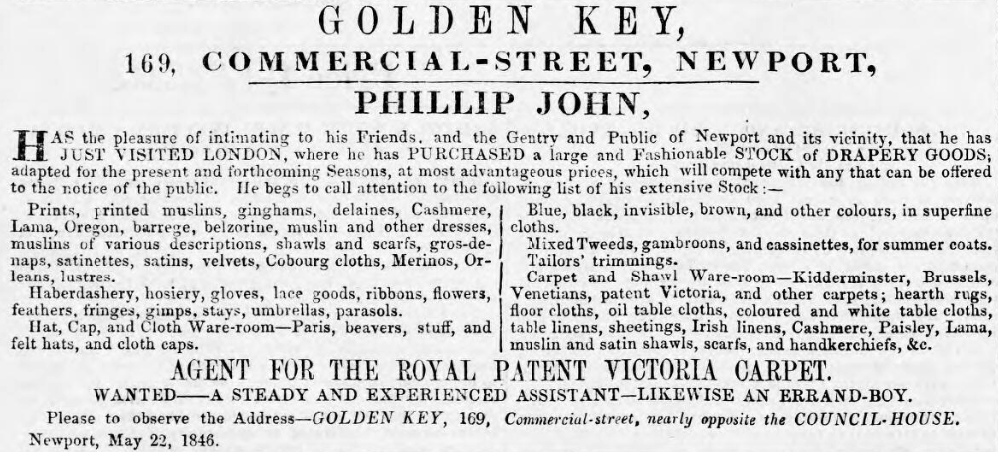

Extraordinary
A cow, the property of Mr. J. Clark, Church Farm, Malpas, gratified her master, last week, by the birth of three fine calves, which, with two other calves, presented by another cow, on the same farm, a few days before, are "alive and kicking."
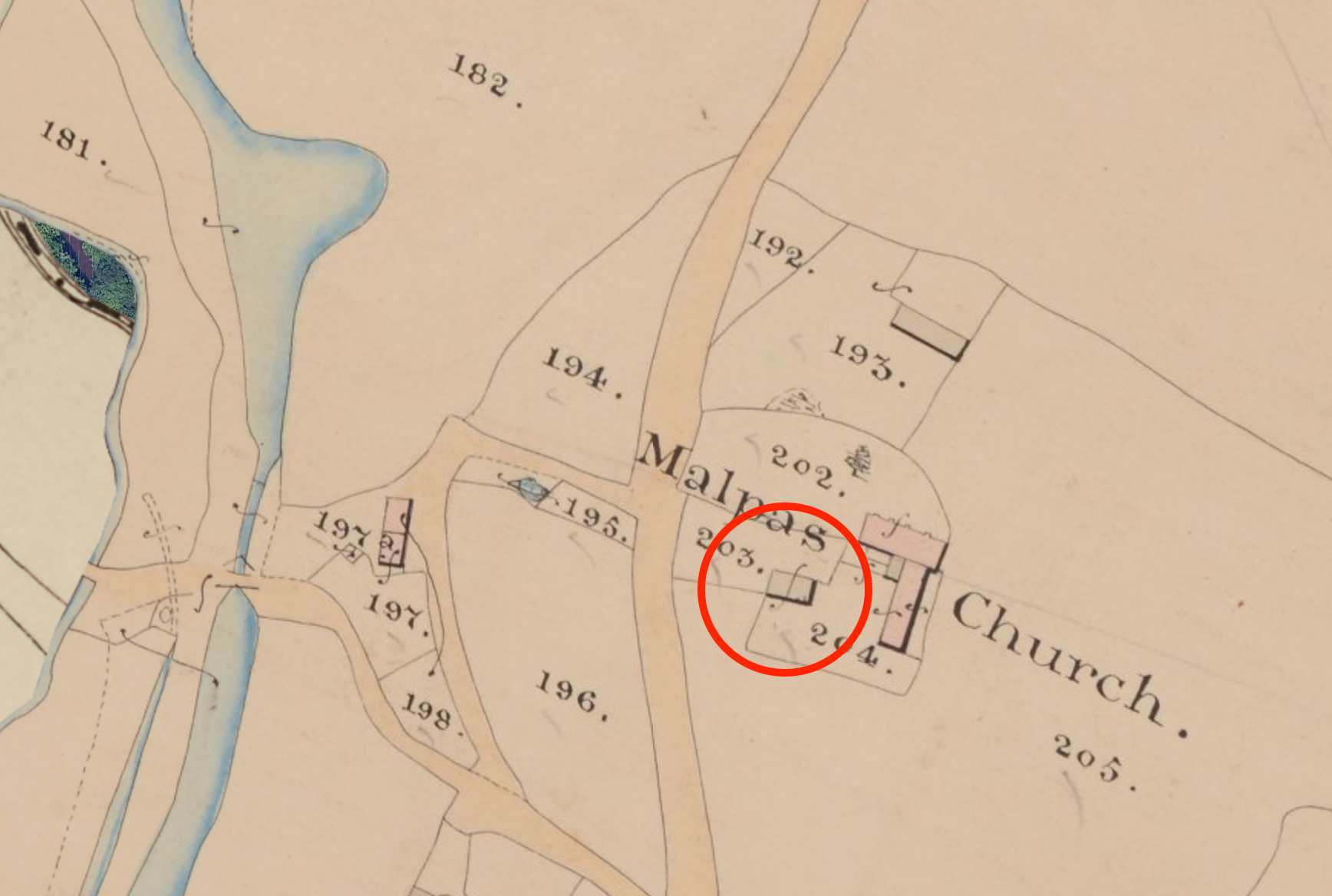
— Monmouthshire Merlin, 15th March, 1851


Stealing an Apron
Sarah Welsh was charged with stealing a flannel apron, the property of Rachel Morris. Prosecutrix said she was the wife of Thomas Morris, and resided at Bassalleg. On the night before last Christmas, she had gone out in front of her house, and dropped her apron. She did not miss the apron until next morning. On Thursday week last she went to the prisoner's house, in consequence of having heard that the apron was there, and asked to be allowed to see it. Prisoner said that the apron which she had worn, was one that her daughter had bought. She also told witness that she had lent it to a women to go to Cardiff, and she could not see it then. Witness then gave information to the police. The apron was worth 5s.
PC Davies said he apprehended the prisoner on Monday evening, at her house, and asked her if she had an apron belonging to Mrs. Davies. She said, "No," but had bought one of a young man at Pie-corner, some time back. She afterwards said she had bought it of a man at the door. Witness asked her where it was, and she said she had lent it to a woman to go to Cardiff. She brought it to his house on the same evening.Prisoner pleaded guilty to picking the apron up, but said she had no intention of stealing it. Sentenced to one day's imprisonment.
— Monmouthshire Merlin, Saturday 2nd May, 1863
'Keeping a Game Cock'
John Pritchard was charged with keeping a game cock, dangerous to the inhabitants of Church-street, Pillgwenlly. A woman, named Keyse, said that two of her children, who appeared in Court, bad been injured in the face, by the cock flying at them. The defendant promised to kill the cock, and the case was adjourned for a fortnight.
— Monmouthshire Merlin, Saturday 2nd May, 1863
'Trespassing in the Round Table Field'
Four men, named George Watkins, Edward Todd, James James, and Whitlock Williams, two of whom did not appear, were summoned for trespassing in the Round Table field, the property of Mr. Justice.
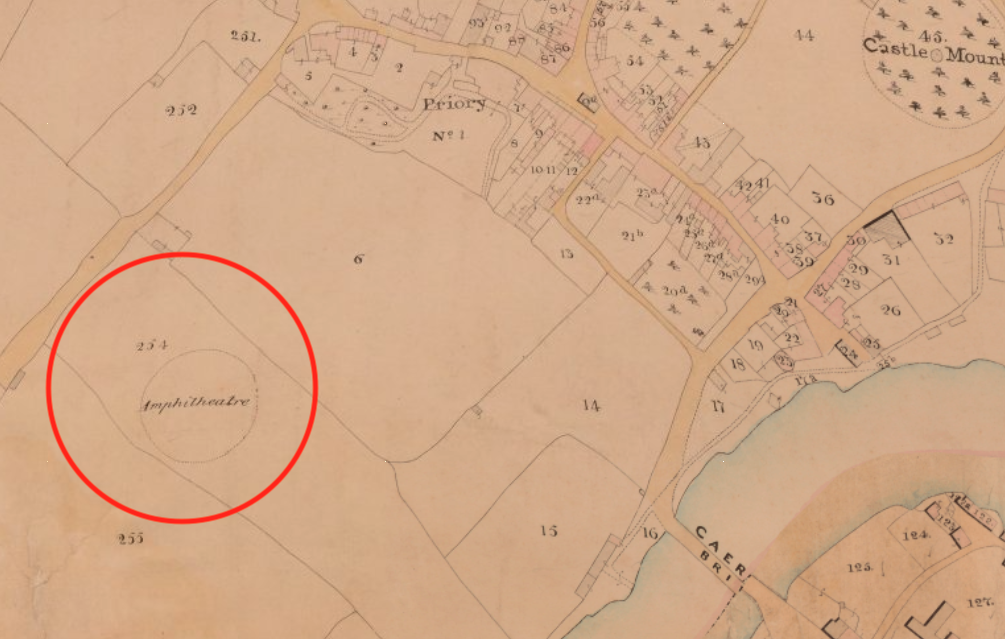
Sergeant Wilcox said he saw the defendants lying under a tree in the field, at four o'clock on Sunday afternoon, with a jug of beer by them. He had received several complaints of persons trespassing. Cautioned, and ordered to pay 3s. costs each.
— Monmouthshire Merlin, Saturday 2nd May, 1863



'Cost of Licenses'
Published as part of an Almanack in The Monmouthshire Merlin in May 1883, a list outlines the cost of a license for a large variety of things from standard things such as beer, spirits and wines through to playing cards, male servants and vinegars.
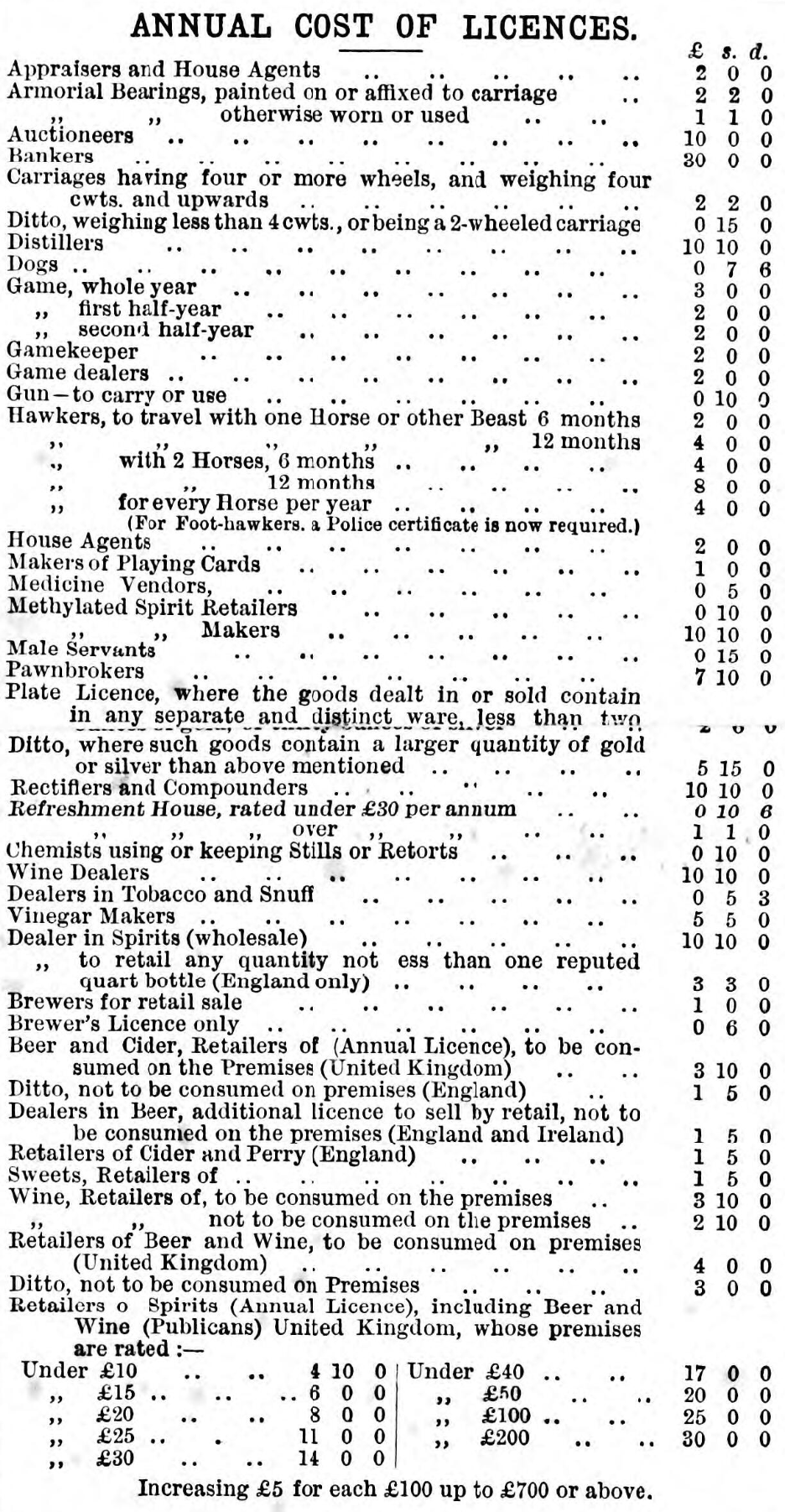

No. 2 Palmyra Place

Easily missed, the two houses on the short Palmyra Place at the end of Commercial Street have been there since at least 1880 and No. 2 was being advertised in the Monmouthshire Merlin in October 1880.
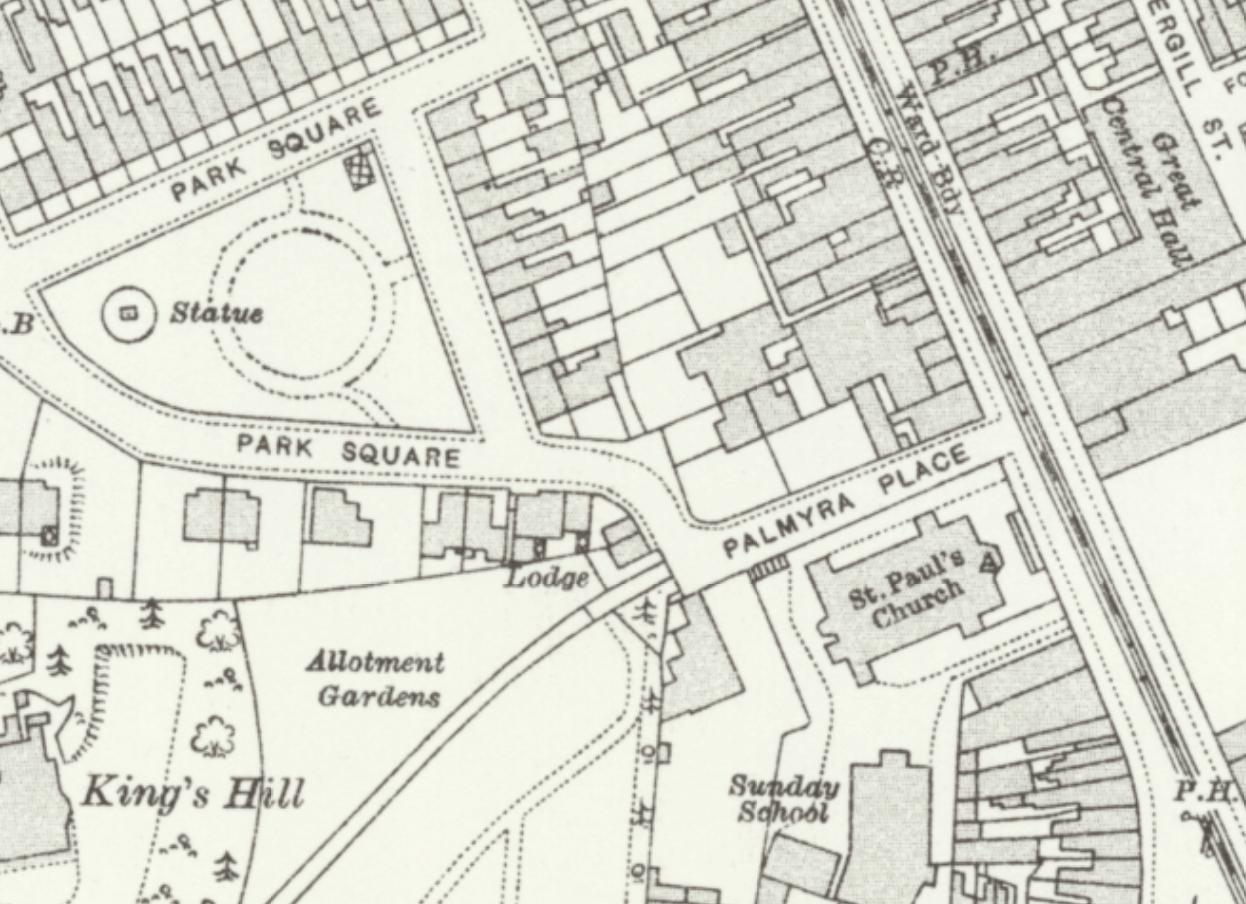
Palmyra Place has always been a short street and originally only led to Park Square before Keynsham Avenue and Ivor Place were built.
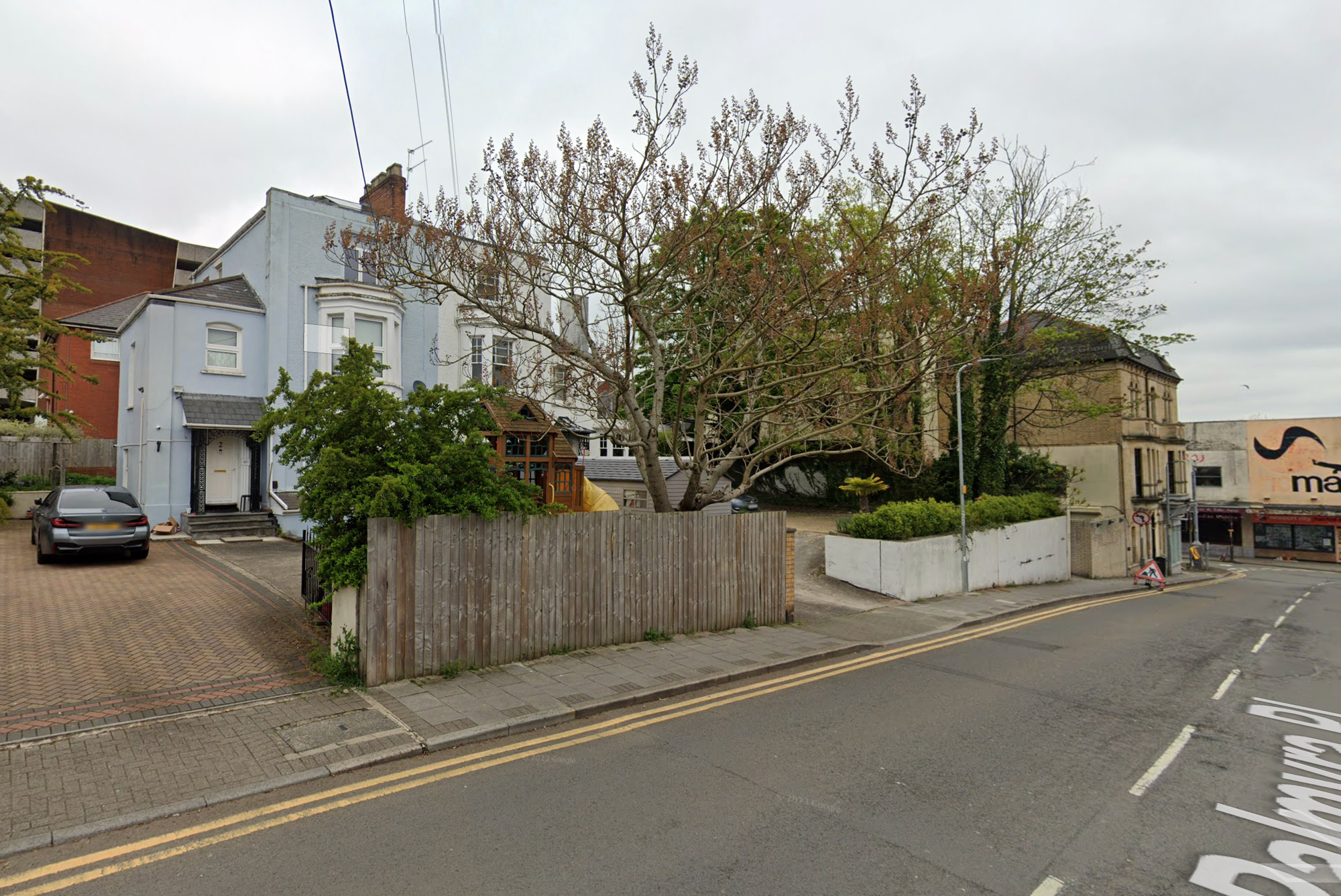

'Telephonic Communication'
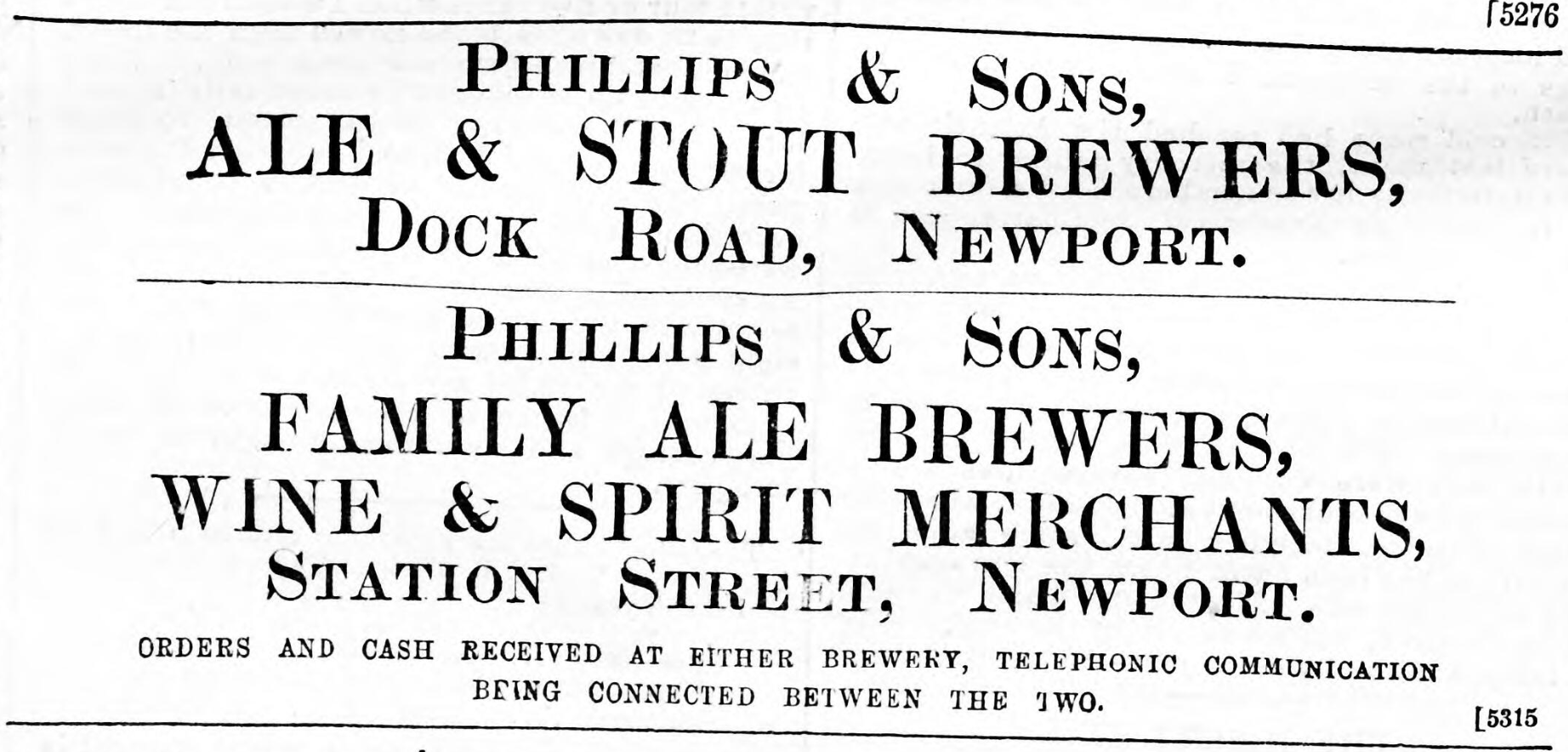
An advert for the Phillips & Sons brewery who had premises on Dock Road and Station Street and it didn't matter where you placed your order as the had 'telephone communication being connected between the two'.
— Monmouthshire Merlin, 28th December, 1883

'Early Photography in Newport'
Located a 'few doors above the Catholic Church' on Stow Hill, a Mr Saxby was offering a service providing early photographic portraits using two techniques called Heliotype and Collodion.
Heliotype was the earliest form of photography invented in the 1820s with the View From The Window photograph from 1826/27 being considered the first ever photograph.
The collodion process was developed in 1848 by Frederick Scott Archer and published in 1851. The wet plate collodion process was the beginning of photographic mass production, greatly increasing the accessibility of photography for the general public.
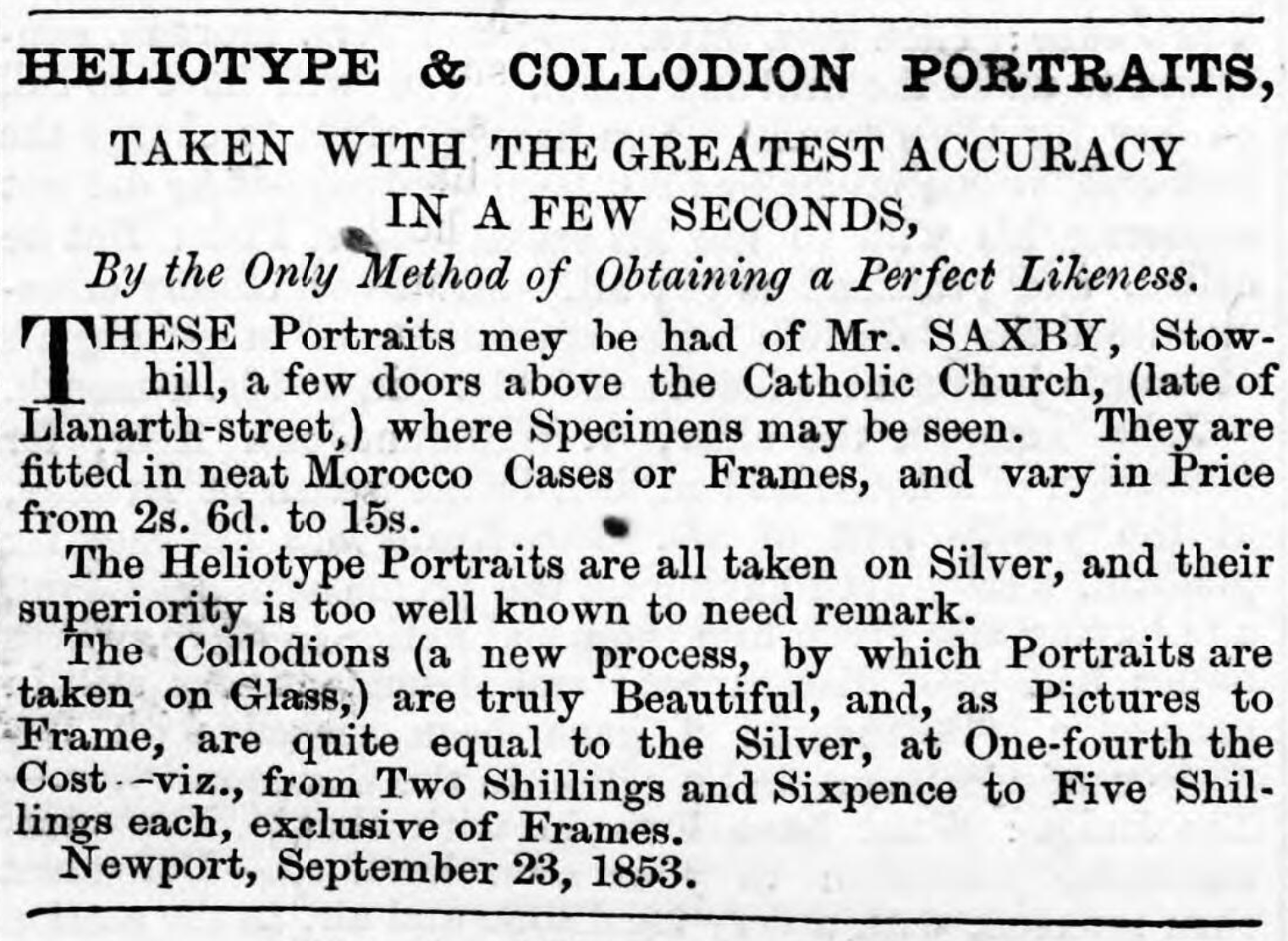
The photograph below from 1860 is an example of the types of portraits Mr Saxby would have been offered to the people of Newport.


Crossing in High Street
A paragraph (sent by a correspondent) lately appeared in this paper, the purport of which was that a horse had fallen, from the great slipperiness of the flags in High-street, near the turn to the South Wales station that such accidents had previously occurred, and that the company were to blame.
The correspondent might with equal justice have blamed the Board of Trade, in the matter; as it is the duty of the authorities of Newport, not the railway company, to remedy any defects that exist in the path alluded to.
— Monmouthshire Merlin, Saturday 24th June, 1853

A Runaway Wife
A few days since, a respectably-dressed miner came to this town, from Cornwall, in pursuit of a faithless wife, who had deserted him and her five young children, taking with her the last born, just four years of age, and leaving, also, an aged mother, almost broken-hearted at her misconduct.
The poor man had traced the fugitive from Cornwall to Bristol, and there he found that she had proceeded to Newport on board the Avon steamer. He followed, only to find that she had gone off to the Hills with the invader of his peace and happiness and to know there was now but extremely little hope of discovering her retreat.
When asked why he had pursued so worthless a creature, the poor fellow, with the true feelings of a father, said he wished to recover his youngest and darling child; while, to lessen the agonising sorrow of her aged mother, he would consent to restore his faithless wife once more to his home and heart.
— Monmouthshire Merlin, Saturday 24th June, 1853

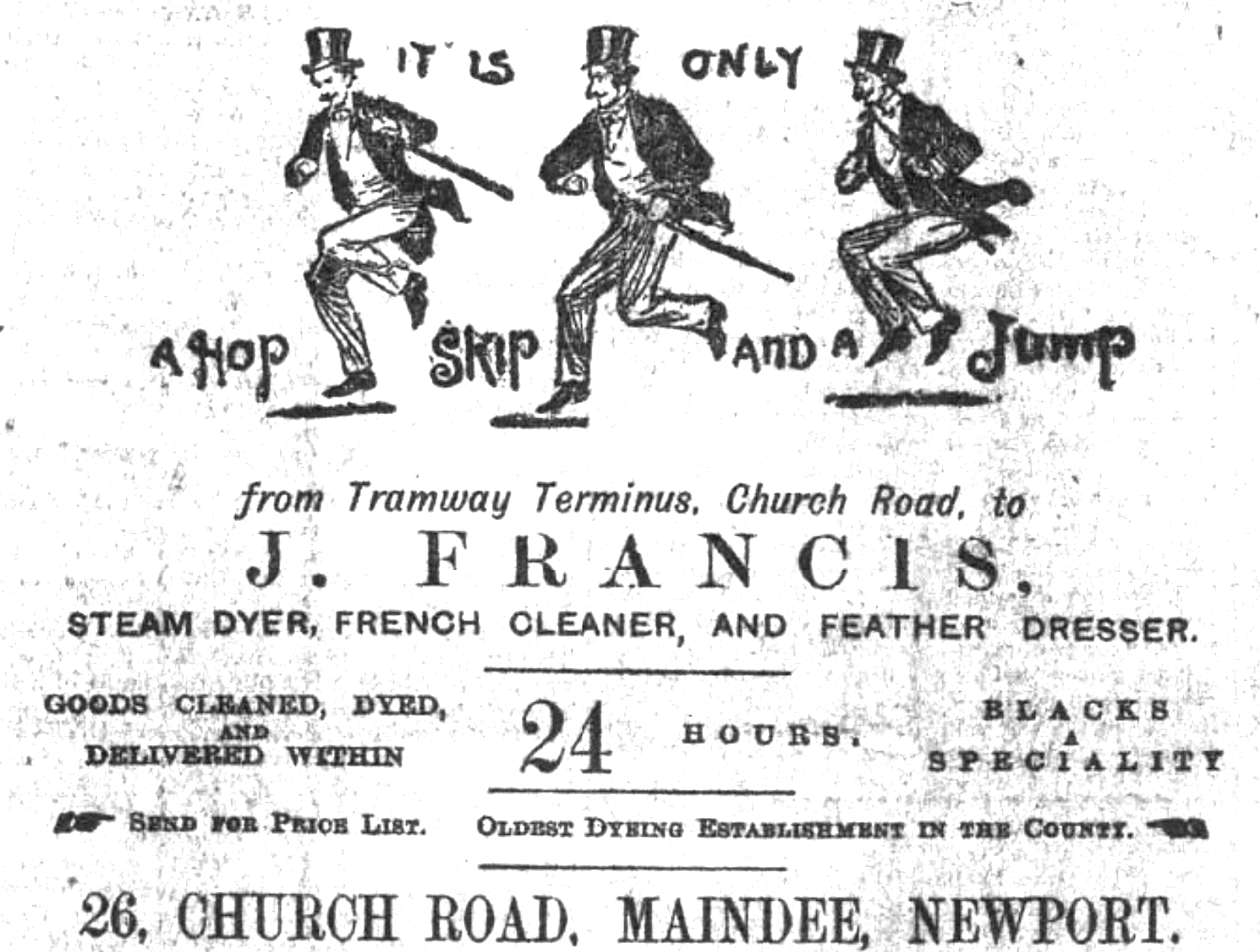

'Otter Hunt in Malpas Brook'
On Monday last, Malpas brook, in this neighbourhood, was the scene of an animated hunt with the celebrated dogs of Mr. Lewis, of New House, Glamorganshire. After a long search, the "dwrgi" was at length found—then came the tug of war. The chase was a close one, and lasted one hour and five minutes, during which, four desperate and fierce encounters took place.
The varmint was at length killed in fair combat, and proved to be a dog otter weighing 22lbs. Among the pack, those named Cheater, Crony, Brusher, Piper, and Tuner, greatly distinguished themselves by their courage and bottom, all of them bearing severe marks of the teeth and punishing qualities of the otter. One of poor Tuner's ears was slit quite open. We must not omit to mention the bravery of a little terrier dog named Snap, belonging to Mr. Jones, of Pant-yr-eos. This good un several times tackled his formidable enemy, and nobly performed his part.
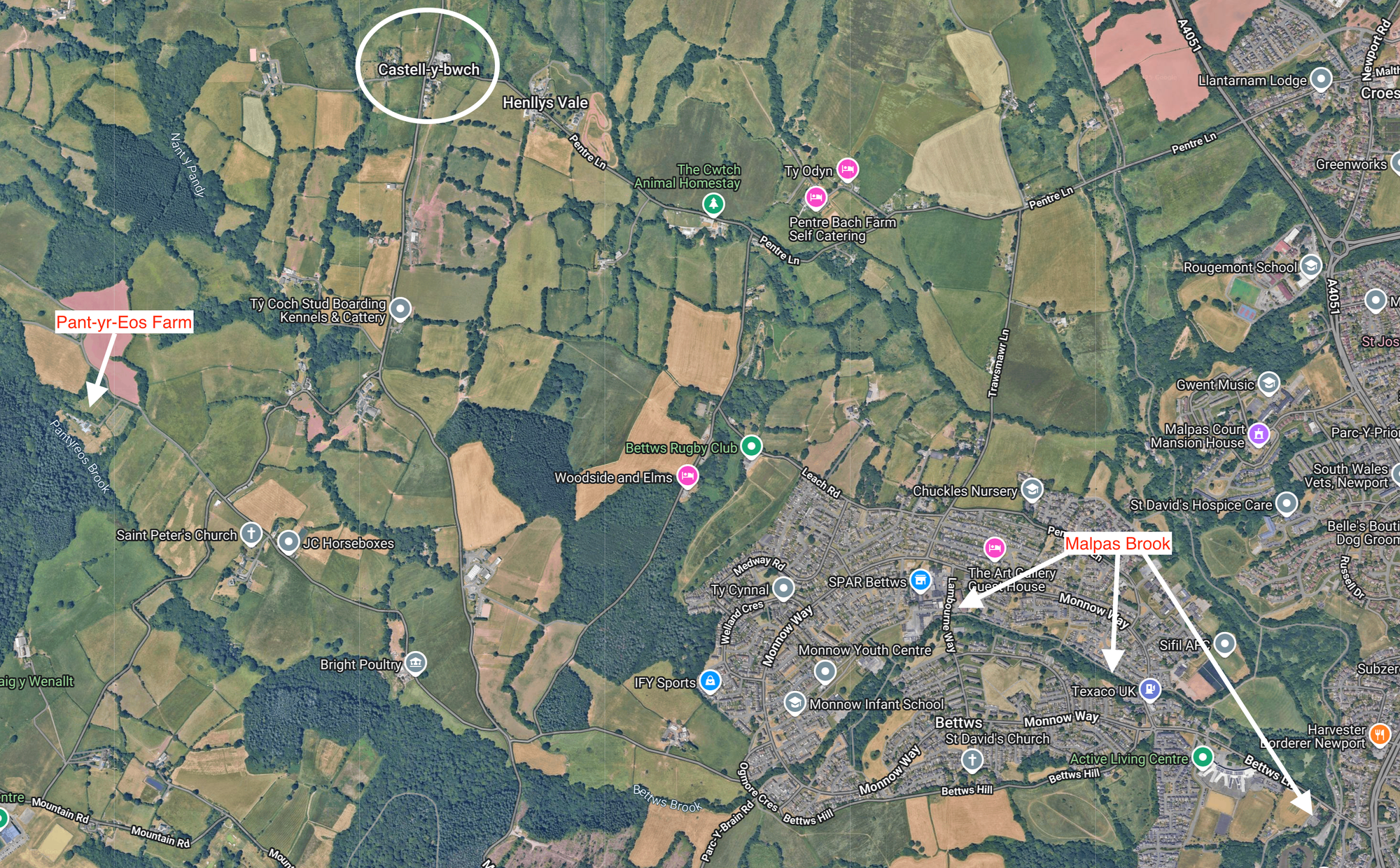
Billy Smith, the huntsman, who was mounted on his favourite little mare Lucy—was in a high state of glorification at the success of the hunt, and bore away the enemy of the finny tribe in triumph; and after the welkin had ceased ringing, from the shouts of the huntsman, and the accompanying chorus of the pack, the parry adjourned to Castell-y-Bwch, where, in high spirits, "thev fought their battles o'er again." It is supposed that the bitch otter and her whelps still remain on this stream—there are very sharp eyes on the look out for the spraints, and if found, we hops the same dogs will finish their useful work, of exterminating these destructive and voracious animals, which, in conjunction with the mal-practices of the vile poacher, are the chief cause of the scarcity of fish in out many beautiful streams.
— Monmouthshire Merlin, 4th May, 1844

'The Railway in Newport'
The following are the particulars of the arrangement made between the Corporation and the South Wales Railway Company, by which it will be seen that the borough has secured a new entrance from the Marshes-road, by the Canal side, into High-street, which will, we understand, give 15 feet headroom under the South Wales Railway; and a foot-bridge, from the passenger station, to Pentonville, and it is understood that the Company will complete such public works before opening their communication with the Pontypool Railway:—
"The South Wales Railway, as already constructed, crosses a road or street in the town of Newport, called Thomas-street, on the level thereof and the railway by this act authorised, will also cross the same road or street on the level thereof, near to the point where the existing railway crosses the same, and the said intended railway is also intended to cross near the same point, and on the level thereof, a certain other road or street in Newport, called Mill-street and it is expedient that provision should be made by giving to the public, facilities for crossing the said existing and intended railways, and also for relieving the inconvenience which might result from such level crossings as aforesaid.
And whereas the company have powers by this act to purchase, for the purposes of their undertaking, certain lands adjoining to the road which forms the communication between High-street and the Marshes-road, near Mill-street Bridge, in Newport aforesaid, be it enacted that the company shall, and are hereby required forthwith, upon the construction of the said intended railway, to erect, and for ever thereafter maintain across the said existing and the said intended railways, a good and substantial bridge, not less than eight feet wide, of timber, or such other materials as they might think fit, for the passage of foot passengers across such railways, from the road belonging to the company, and leading from High-street aforesaid to their station at Newport, to a street in Newport aforesaid called Pentonville; and shall at all times permit all persons to have free and uninterrupted passage over such bridge and the company shall also forthwith appropriate and set apart so much of the said property, which they are hereby authorised to purchase, adjoining the said road leading from High-street to the Marshes-road, near Newport Forge, as may be necessary for the convenient passage along the said road, between such points, of carriages, carts, and other vehicles and so as the width of the said road may be not less than 30 feet, and the lands so set apart for such purpose shall for ever thereafter be dedicated to the use of the public as a highway between the High-street and the Marshes-road aforesaid."
— Monmouthshire Merlin, Saturday 24th June, 1853

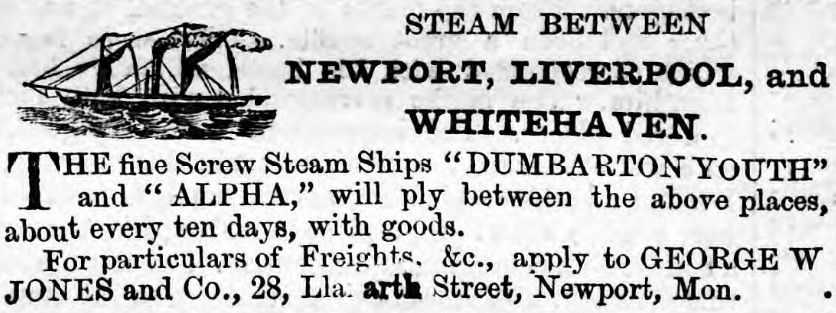
Caution to the Public
A sailor, respectably dressed, and named Andrew Banks, of Aberdeen, lately took lodgings at the house of Mr. Gwyer. Pillgwenlly, and after running up a thirteen week's score, daily, saying he was on the look out and awaiting a vessel, frequently making allusion to his excellent store of clothing, &c., decamped suddenly a morning or two since, leaving no trace by which to follow him. We understand that measures are being adopted to discover him.
— Monmouthshire Merlin, 15th March, 1851

Supply of Water to Small Tenements
SIR,— You have frequently remarked on the evil consequences arising from the want of water in small tenements. Now, sir, this continues, notwithstanding that the Water Works Company are able to lay on pipes of capital water, at a very cheap rate. I would beg to suggest, that all landlords and landladies of small houses should lay on pipes for the supply of their tenants at one main cock, where there are four or five houses in one possession, and the amount — say 2d. per week — be added to the rental.
This would be a good means for supplying the necessitous, and not a costly one, either to landlord or tenant; while that vast body of water, which lies almost at our doors, would thus be appropriated to its beneficial and legitimate purposes. I trust the good sense of landlords will take the hint, before compelled by the town-council, under the Health of Towns Act.
I remain, Mr Editor, yours obediently
HEALTH'S ADVOCATE
Commercial-street, July 29th, 1850
— Monmouthshire Merlin, 3rd August, 1850

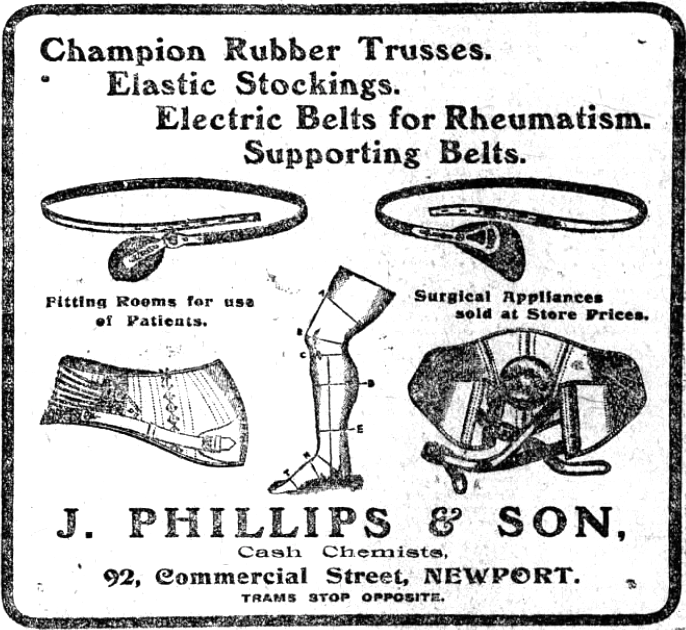

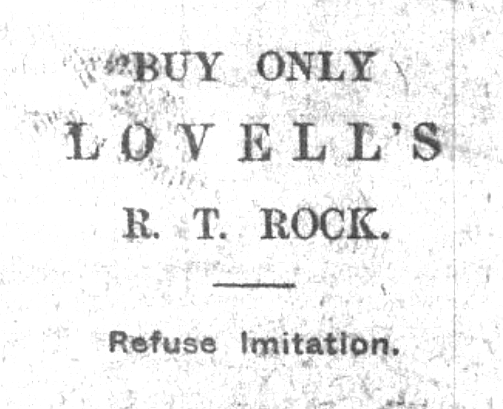
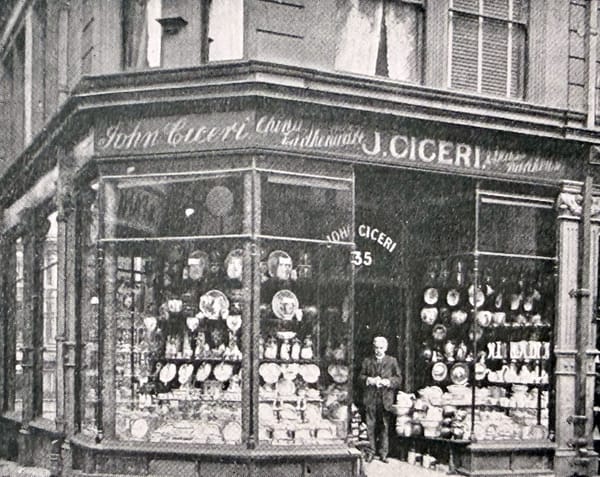
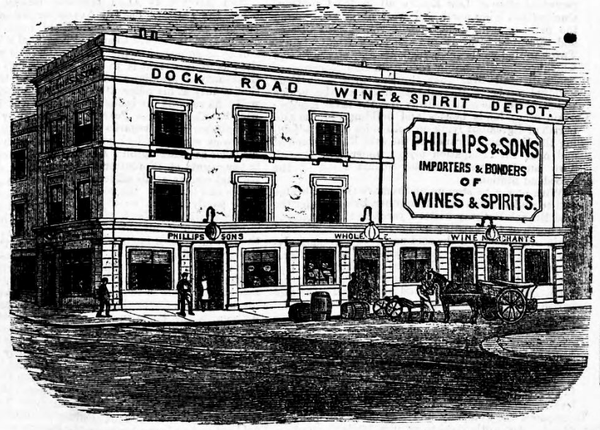
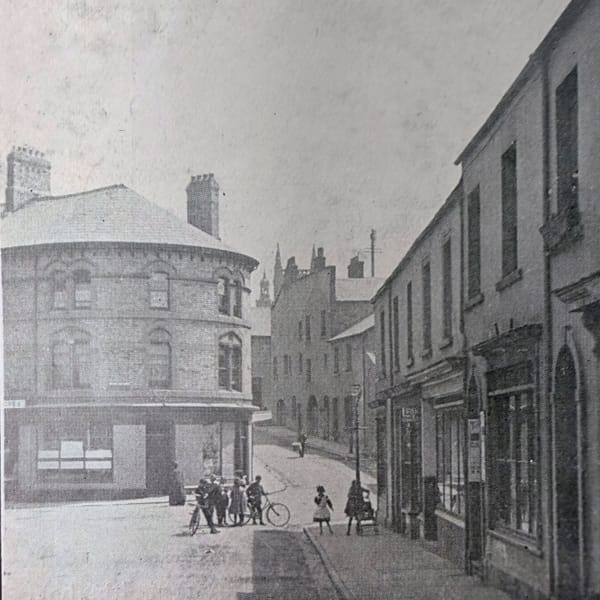
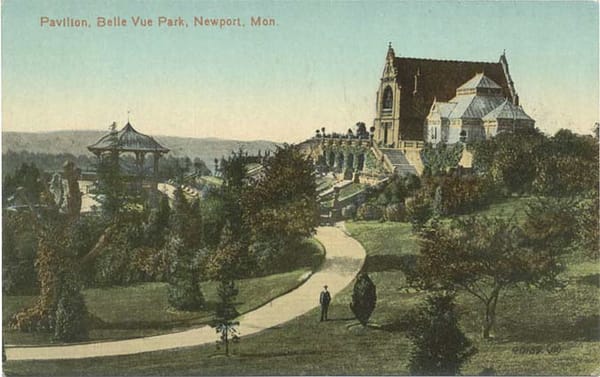
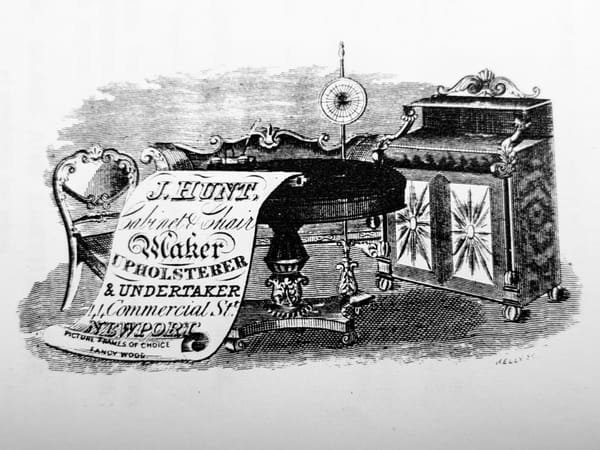
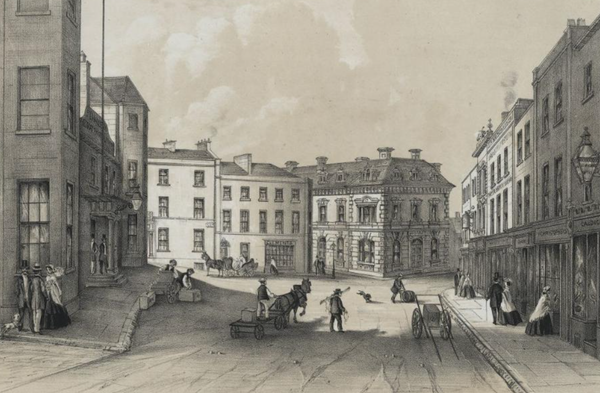
Member discussion